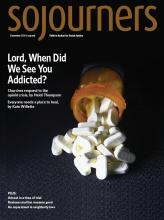AFTER A CHRISTIAN missionary handed Mustafa Akyol a Bible on a busy Istanbul street, the Turkish journalist became fascinated with the many similarities between his Muslim faith, Christianity, and Judaism. As a moderate Muslim, Akyol had been studying the Quran with a group of friends for some time. He used his study group discussions as background to inquire about the other two religions.
The result is The Islamic Jesus, which takes the reader on a complex, winding journey, detailing many of the profound historical and religious bonds of the three religions. They “are like three siblings,” explains Fred M. Donner, a respected historian of Islam, in a University of Chicago lecture. He points out that there was quite a bit of fluidity and interchange among these “siblings” in the first few centuries after the Prophet Muhammad died in 632.
Akyol, who writes for the Turkish newspaper Hürriyet Daily News and The New York Times International Edition, became engrossed early on with the different ways that Jesus is portrayed in the New Testament and the Quran. The New Testament, of course, describes Jesus as divine, part of the Trinity, and the son of God. The Quran is reverential toward Jesus, and he is seen as the last Jewish prophet, but not as divine. The Islamic view is that there is only one God, and no Trinity.
Read the Full Article

